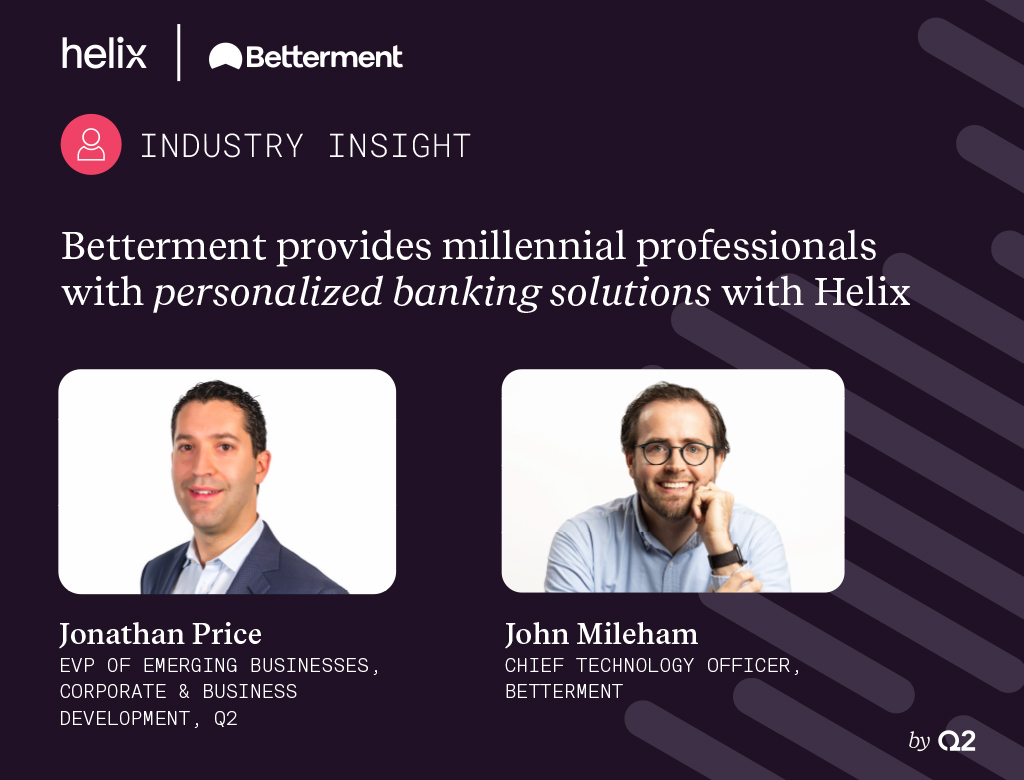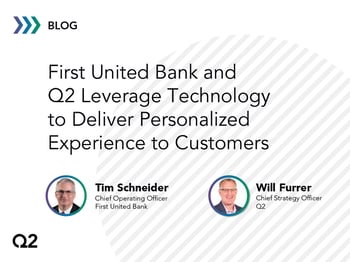Q2 EVP of Emerging Businesses, Corporate & Business Development Jonathan Price sat down with Q2 customer and digital investment advisor Betterment, which has more than 700,000 active users and $32 billion in assets under management. Price spoke with John Mileham, Betterment’s CTO, who traced Betterment’s launch, expansion of products, philosophy on hiring the best talent, and what he sees as the future.
Below is a transcript of the full conversation.
Jonathan Price (JP): John, I want to start by getting your perspective on how you see the space evolving over the next couple of years.
John Mileham (JM): I think we’re going to see an increase in personalization and choice, particularly in finance guide and choice. For example, we’ve enabled socially responsible investing portfolios that allow our customers to align their values with their investments.
On the advisor side, we have the ability to customize the model portfolios that we put customers into. Our advisors can help customers on our platform with that increased level of customization.
JP: As you think about Betterment being known for automated investing, and your evolution into banking solutions, can you tell us what drove your decision to enter that market?
JM: We’re always thinking about ways to add products to our lineup that create a better whole than the sum of its parts. And we drive that by providing customers with a seamless experience that adds value for them. When it became clear that partnering with banks to offer checking or cash management accounts was an opportunity to bring more people’s everyday money into their long-term banking and provide better incentives, we jumped at that opportunity.
JP: Betterment’s known to be a pretty mission-driven company. Just curious if you could share what problems you’re focused on solving for your end-customers at a high level?
JM: Our core customer is the millennial professional, and they’re making headway in their careers and thinking about their life stages. They’re thinking about having families, getting married, buying a house, and even beginning to think about their retirements.
Millennial professionals consume a lot of their lives digitally. They shop on Amazon and watch Netflix, so they expect all their financial services to be online as well. Our opportunity is really to provide a seamless suite of services that fit together naturally and help them improve their lives.
JP: When you think about your relatively new banking offering, we’re in a world now where virtually anyone can go about building banking services on top of their existing apps using open APIs. Just thinking about your larger platform and customer base, how do you think about differentiating vis-à-vis your banking offering?
JM: Well, as Q2 knows, building a robust banking core is not a small lift. On top of that, neither Betterment nor any of its affiliates are banks so figuring out the right banking partners to work with to provide FDIC-insured accounts and all those challenges aren’t easy tasks either. By partnering with Q2, we were able to focus wholly on differentiating our product and providing a deeper integration with the rest of our product lines, as opposed to having to do the big lift of building that core functionality ourselves. That’s already been done so well by partners like Q2.
JP: That makes sense. It’s sort of the MO of Q2’s business is to put each stakeholder in a position to do what they do best. If we flip over to the technology side for a minute, when you think about some of the technology challenges you’ve overcome in building your business – whether it’s on the investing side or the banking side – what were some of the bigger challenges and how did you overcome them?
JM: When we launched our business over 10 years ago, we were sort of the first robo-advisor, although we prefer the term digital investment advisor. The formative challenge for Betterment was building our whole brokerage stack from the ground up. That included being able to offer fractional shares to everyday investors at scale. So, that is a big lift and kind of a scary thing, especially for a tiny little startup that doesn’t have a product to market yet.
The riskiest time for any product company – and especially a startup – is the time between when you start to build and when you actually have a customer feedback loop in place. So, that experience informed us when we wanted to bring a new big-lift product into the market. We wanted to cut down on the time when there’s no customer feedback loop.
JP: One of the challenges that we’re all facing from a technology perspective is acquiring great talent. As you strategize and develop best practices to hire in a market that’s obviously ultra-competitive, what strategies let you hire great talent and ensure that Betterment has the lifeblood of building its business?
JM: First of all, I’d like to reiterate that Q2 has been a great partner, not just in building and deploying our product, but in the conversations along the way about how we think about being competitive in this intense hiring market for engineering talent. So, for me, it starts off with the fundamentals: as a builder, what you need is a platform and an environment, both human and technical.
That allows you to run fearlessly, doing your best work and owning your outcomes. I think also, in order to drive that point home in this environment, it’s especially important to be able to tell your brand story as an engineering firm, independent of your product. We’re investing there and beginning to tell that story.
JP: Maybe that’s a good segue over to the partnership between Q2 and Betterment. Could you share how you went about the search to find a partner on the banking side? How did it start? Where did it take you? Ultimately, how did you end up choosing Q2?
JM: Like any major strategic initiative for us, or any product that we wanted to create from nothing, we did a full build vs. buy valuation. We talked to everybody we could in order to get smarter about the challenges that we faced. Ultimately, it came down to Q2 having a robust feature set, modern APIs, and a team that when we spoke to them, we really felt like they could help us achieve our vision of this deeply integrated product into our broader product suite.
JP: Has there been anything in working with the Q2 team that has stood out as being differentiating once you made the decision to work with us?
JM: Honestly, from a product perspective, there’s not any one thing that makes a banking product, because I think customers have an incredibly high standard at this point for what a modern banking experience is. So, in many ways, it was really about having that high level of service across all the capabilities that a modern banking system needs. That really sold us and continues to have us come back.
JP: Good to hear. And last, I really wanted to congratulate you on the Series F financing. I know that was a big milestone for Betterment, and it’s great to see you having continued success. As you look now at the future, with that funding in place, what do you see – whether it’s with Q2 on the banking side – or, more broadly, how do you envision achieving that?
JM: The Series F has been a great achievement, and I hope that signifies the strong and sustainable growth that we’ve been experiencing. You know, as we look ahead, I think one of our biggest opportunities is to deploy more of what we know we need to bring to market, and that will involve things like hiring.
We’ve already been hiring at a brisk clip, adding 150 employees in 2021. We’re on track to hire another 50 or so before the end of the year. We’re really leaning into a strong position of diversity, equity and inclusion, hiring with ethnicity, gender, personal background and lived experience as major guiding lights. I think we’ve been really successful so far and hope to continue that.
From a broader strategy perspective, I think the future is really going to be expansive across all of our lines of business, but one area to highlight is our Betterment for Business product, which started off as a 401K provider and expanded into broader employee financial wellness benefits. The various wellness products can be brought to bear on our retail customers as well and help them through their financial lives. So, we’re really looking for this kind of fit where a single product or set of products can continue to expand and improve people’s lives.
JP: Maybe just to wrap up, in thinking about how you view the competitive landscape: we are in a world where clearly there’s a lot of convergence around financial services. Whether it’s traditional providers or fintechs, there are players that want to embed banking and related financial services into their ecosystems. What do you see as Betterment’s competition, whether it’s on the investing side or the banking side?
JM: I think the challenge, when you’re somebody like us, is that you have many different kinds of competitors. You have to compete on product with some of the upstarts, but ultimately, what we’re trying to do is provide the same level of service and surpass the expectations of the old guard. So, when we look at our competitive set, it’s tricky out there to find direct comparisons to what we want to do.
Ultimately, what we’re trying to do here is build a durable institution that’s more deeply customer aligned than what came before. You have to look around for the best of what’s going on and the biggest opportunities to bring that to your customers.
JP: We really appreciate you taking time today to spend with me. There’s real excitement around where we’re going to go together, Q2 and Betterment, in the future.
For more information on Helix, visit Helix.Q2.com.
Advisory services provided by Betterment LLC, an SEC-registered investment adviser. Betterment Cash Reserve is offered by Betterment LLC.
Brokerage services provided to clients of Betterment LLC by Betterment Securities, an SEC-registered broker-dealer and member of FINRA /SIPC.
Betterment Checking made available through Betterment Financial LLC. Checking accounts and the Betterment Visa Debit Card provided by and issued by nbkc bank, Overland Park, Kansas, Member FDIC. Neither Betterment LLC nor Betterment Financial LLC, nor any of their affiliates, is a bank.





